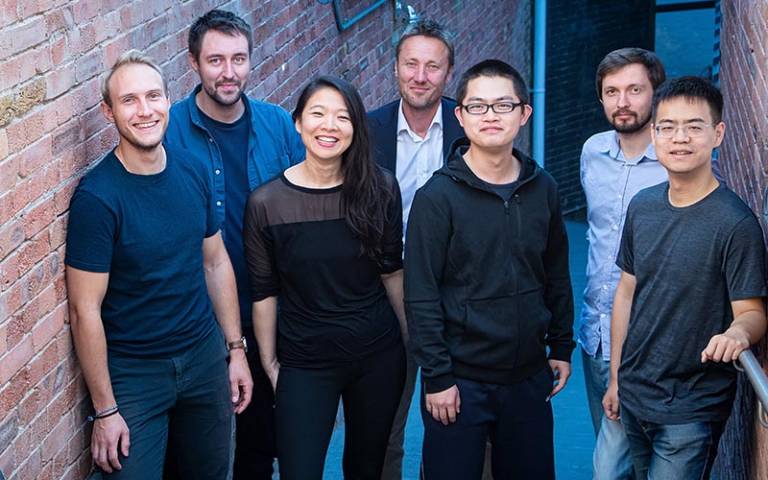Quantum computing points the way to new chemicals, drugs and advanced materials
UCL startup Rahko is developing new approaches to quantum computing to enable the design of future batteries, advanced materials and therapeutic drugs.

29 July 2020
Rahko was founded in 2018 by UCL Computer Science PhD students Leo Wossnig and Ed Grant, alongside Miriam Cha and Ian Horobin.
Since then, the company has attracted significant interest and has partnered with major players in the field including Microsoft, Nvidia and IBM. Rahko has also secured a three-year collaboration with the science and technology company Merck.
A new kind of computing
Rahko is a quantum machine learning (QML) startup. The company develops machine learning software to run on the first generation of truly practical quantum computers. These computers will be available in the near future and operate very differently from classical computers. They take advantage of the phenomena of quantum mechanics, for example where subatomic particles can appear to exist in more than one state at any time.
The advantage of this underlying architecture is that quantum computers can, in theory, solve problems which are difficult or impossible for classical computers. These include understanding the precise behaviour of electrons in solids such as crystals, which is critical in the creation of new catalysts or for novel battery designs.
Big tech companies such as Google and IBM have made important strides in building quantum computers. However, major challenges remain, including issues around the error rates of calculations and associated noise.
Material benefits
The big companies are working on engineered solutions to the error problem, but an alternative might be to use machine learning. Machine learning is a type of artificial intelligence where computer systems learn from data, spot patterns and make decisions without supervision. This is the basis of Rahko’s approach.
One of the areas they’re applying their technology is chemistry simulations. These simulations help us understand how materials behave and how chemicals interact.
A consortium led by Rahko won an Innovate UK grant for their project Quantifi. The project aims to pave the way for the simulation of strongly-correlated materials on quantum computers. These new materials could be used for better batteries, a host of clean technologies, and vehicles of the future.
The consortium brings together several leading academic and industrial scientists with partner organisations, including Johnson Matthey, King’s College London, and the National Physical Laboratory, with support from Amazon Web Services (AWS). Rahko was also a launch partner of AWS’s Amazon Quantum Solutions Lab.
Rahko’s recent collaboration with Merck will explore how QML could assist in the discovery and development of novel drugs, molecules and materials. It’s thought that QML could make these processes faster and more efficient and precise.
The cutting edge of research
The inspiration for Rahko partly came about through Leo Wossnig’s research as a PhD candidate in the UCL Department of Computer Science.
There, Leo worked alongside world-class researchers, such as Simone Severini (now at AWS Quantum), Aram Harrow (MIT) and Patrick Rebentrost (NUS Singapore), as well as industrial partners such as Nathan Wiebe and Matthias Troyer (Microsoft), Masoud Mohseni (Google), Shashanka Ubaru and Lior Horesh (IBM).
“Through the interaction with all these brilliant people I had the opportunity to learn a lot about the drawbacks and opportunities in quantum algorithms,” Leo said, adding: “After my group and I produced ground-breaking results using quantum machine learning, we realised the huge opportunity in front of us. This led quickly to the decision to form a company.”
Startup support
Rahko was officially incorporated at BaseKX, UCL’s entrepreneurship hub, where they received free office space, advice and mentoring on everything from recruitment to contracts.
The company was also in the first cohort of Conception X, a venture builder to help PhD students commercialise their research, launched out of UCL Engineering.
Since then, Rahko has secured £1.3 million in a seed funding round led by Balderton Capital, with participation from venture capital firm AI Seed and angel investors.
Leo said: “A year on from when we left The Hatchery at BaseKX, we’re able to reflect on just how much we have gained from the breadth of support across the UCL entrepreneurship support landscape.”
Jerry Allen, Director of Entrepreneurship at UCL Innovation & Enterprise, commented: “Rahko is an example of a startup at the absolute cutting edge of technology, who’ve benefited from the unique ecosystem and world-class research base UCL has in quantum computing and AI. I’m extremely proud of what they’ve achieved since leaving UCL’s entrepreneurship hub.”
Links
Find out more about:
- entrepreneurship support for UCL students and recent graduates
- joining the Hatchery startup incubator
Photo of the Rahko team supplied by Rahko.
 Close
Close

